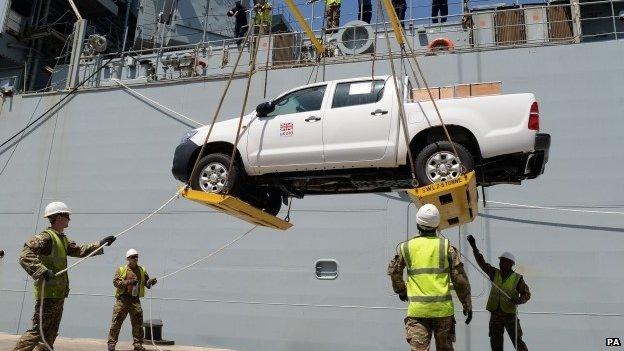Ebola outbreak: RFA Argus arrival gives rise to hope
- Published
The BBC's Andrew Harding reports on the battle to stop the spread of Ebola
The giant grey hull of RFA Argus brushed against the dockside in Freetown and within minutes the first white pickup trucks were being swung off its upper deck and ashore by crane.
The British ship is carrying an array of useful items for the fight against Ebola - from medicine to three cargo helicopters that will be used to reach some of the remoter corners of Sierra Leone.
It's 14 years since the British military arrived here to help end a gruesome civil war. At the time I remember standing, with the cheering crowds, watching Royal Marines being lowered from helicopters onto the white sandy beaches nearby.
That beach-front display was a largely symbolic moment, and in the broader scheme of things, so was the Argus's arrival on Thursday - a sign that Britain's much anticipated aid operation for Sierra Leone is finally gaining momentum, with the partial opening this week of the nearby Kerry Town facility.

Shortly after docking 32 pick-up trucks were unloaded
"We're turning a corner," said Donal Brown, who is in charge of Britain's operations here.
Beside him on the dockside, his Sierra Leonean counterpart, Palo Conteh, went even further, telling me that the British operation was "a game changer" in the battle against the Ebola outbreak.
Earlier, I'd been to see the new command and control centre for burial teams, set up in a hall at the British Council offices on a hill in Freetown. British and Sierra Leone soldiers were working side by side, deploying ambulances to collect each new corpse.
Last week, the city had only one functioning ambulance. Now it has 11 and on Wednesday they picked up 73 bodies. Officials sounded genuinely proud about the abrupt progress they felt they were suddenly making.
But that optimism is hard to sustain when you follow the teams out on their duties.
Briefest of prayers
On a steep hillside a mile away, perhaps a hundred people - some wailing in grief - had gathered to say farewell to Marie Turay, 50.
She'd died overnight, and while her husband suspected it was a heart attack, all deaths are now treated as potential Ebola cases here.
The burial team donned their protective yellow suits and sprayed their feet with disinfectant before entering the white stone home to remove Mrs Turay's body.
The team's supervisor, Abu Kargbo, said they needed more protective gear, but that the situation had improved in recent days.
Still, he said "we are worried, worried, worried" about the public's failure to heed the warnings about not touching dead bodies, and by the very real threat that the crowd might turn on the burial team, blaming them for spreading the virus.
In the end, as the wailing grew louder, and more people began to complain about the speed with which Mrs Turay's body was being unceremoniously removed, the stretcher-bearers paused for a matter of seconds to allow a local Imam to say the briefest of prayers over the body bag.
No-one knows the real death toll yet here in Sierra Leone. And it seems very likely that the numbers will rise significantly in the weeks ahead.
But what really counts for those overseeing the fight against Ebola is trends, not figures. Officials talk quietly, and hopefully, of getting the outbreak under control - of breaking the rising curve on a fatalities graph - by early next year.
So there is genuine progress here in Freetown - and given that a third of the population is concentrated here, it's no surprise that the aid focus is being targeted on the capital.
But the next few months are sure to be grim, and brutal, and the fight to tame Ebola is still not a foregone conclusion.